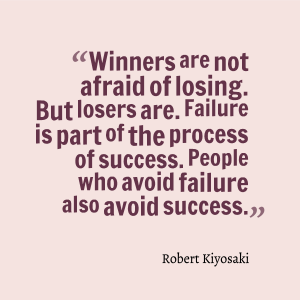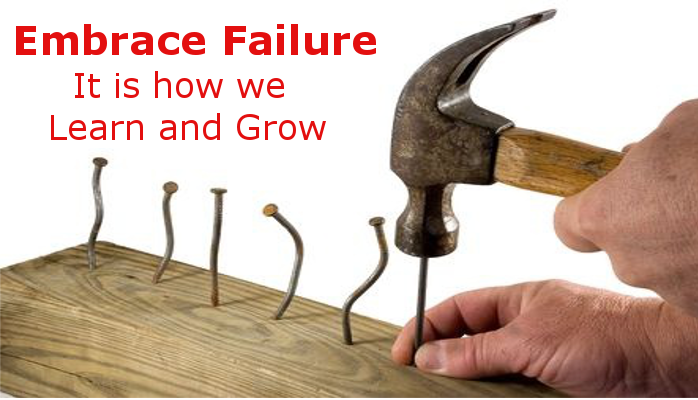You are driving through a busy street in a city and need to park your vehicle. You find a spot that’s perfect to parallel-park your car between two others. Finally, your tiring drive can end. But while backing your car into the spot, you graze your car’s rear into a light pole. This is the side of the car to which you are blind-sided, and can only use judgement. There are an ugly scratch and a dent. After a few more twists and turns, you finally park the car. But your parking attempt suffered a failure. You can take this failure either like a loser or as a person who looks at it as something learnt.
The loser’s attitude

The loser cannot digest the fact that a dent and a scratch have been caused. After having invested a lot in the car, this inflicted defect is unacceptable. In the book Rich Dad’s Guide to Investing, author Robert Kiyosaki talks about 5 types of losers. Here is how each of them would cope with the parking failure.
The liar: When confronted with how it happened, the liar uses bluffs to soften up the incident. “I was watching so closely in the mirror. The light pole just came out of nowhere”. It is obvious that had he/she been watching so closely as claimed, the incident wouldn’t have happened.
In incidents where the liar’s fault cannot be confirmed, they will come up with phrases like, “I didn’t do that” or “How can you say that it’s my fault? Prove it.” For instance, when confronted by someone who didn’t see the incident, the liar is quick to say, “Oh this scratch? It was caused when a colleague accidentally backed her car into mine at the office parking lot.”
The blamer: “I don’t know why the municipality has to put a light pole exactly where the city’s cars are parked. It is sheer apathy”, “Passers-by are insensitive these days. Couldn’t someone have stopped for just a second and pointed out to me that I was backing into the light pole?”. For the blamer, everything and everyone other than himself/herself is the cause of the failure.
The justifier: “The pole was on my blind-side. It’s tough to avoid such a collision with the view blocked from the driver’s seat”. “It’s incredibly hard to park between two cars, especially with a light pole too in the scenario. This can happen to anyone.”. While he/she is not as sore as the blamer, the justifier loves to come up with reasons on why the failure happened due to extra-ordinary circumstances out of his/her control.
The quitter: “Oh man, I knew something like this would happen. It is so risky to drive around the city. Parking spaces are so tight and beyond my driving capability. From now on, I will only drive around my locality and on the wide national highways. Goodbye city roads”. The quitter finds it easy to give up. The activity is completely banned in the future, because of the fear of failure.
The denier: “Nothing happened. Everything’s fine. Dents and scratches are so common these days. Every car has some.” The denier finds it hard to see that a failure occurred in the first place, let alone acknowledge and do something about it.
How to approach the problem as a learner

The first step is to acknowledge that a problem occurred and that it was due to your fault.
“I was backing the car and things were fully under my control, despite the fact that the light pole was on my blind-side. I could have done something to prevent the collision. A mistake done.”
Next is to brainstorm a list of things that you can do to prevent such a mistake in the future. Here would be my list.
- If I am accompanied by someone (almost always Priya, my wife), that person can guide me.
- Request a passerby to stop for a moment and guide me. Thank him/her later.
- Drive a little further, find a parking spot that’s within my current parking skill and walk back to the intended destination.
- A proximity beeper that can warn me when the car gets too close to a collision. This technology already exists, but it’s not in my low-end car. Perhaps our mechanic can help me install it.
- An LCD and a CCTV that helps me see what I am doing when my car is in reverse gear. This will show me blind spots that I can’t see from my driver’s seat. This technology exists too.
By making a list of solutions and prioritising, you can easily go through a mental checklist the next time you encounter a situation where you need to park by backing the car into your blind-side.
I also find that it helps to write down the problem and solutions in a place like my daily journal or my Trello board. Having recorded my solutions somewhere, I can execute the ones that can be immediately done, and schedule the ones that need help. E.g. I can tack some sticky notes to my dashboard that reminds me to ask for someone’s help when I am backing my car. During my next visit to my mechanic, I can ask for a proximity beeper or an LCD to be fitted.
Conclusion
Mistakes happen all the time. It is our reaction to mistakes that determine how we take them in our stride. One can either be bitter about them or use them to be a better version of himself/herself. Next time, you make a mistake, get out your writing pad and give yourself some solutions based on what you learnt and what you can do better.
Downloadable resources
Here is a practice journaling sheet that you can use to record your failures and how you reacted to them. If you reacted to those failures like a loser, then write the ideal way in which you should have reacted, i.e. derive one lesson and find one solution that you can act upon.
Further reading
- Blog post: The magic of mistakes by Geneva Business News
- Blog post: How to learn from your mistakes by MindTools.
- Another of our blog posts: The myth of centum
- Book: Mindset by Carol Dweck
- Book: The Value of Failure by Shane Lester (Amazon.in | Amazon.com)

Failure is an inevitable part of growth. I have found myself in many of these roles, a justifier probably most often. Its a slow and painful process of change to learn from the failure. But a very worth while effort.
That’s true. I had many justifications for not getting into engineering. Everything from the caste-based reservation system to why the education system considered Chemistry (in PCM) as part of subjects whose marks are important for getting into engineering, when most engineering subjects are dependent purely on Maths and Physics. Needless to say, I should have done well enough to score 95% or above and my seat would have been assured.